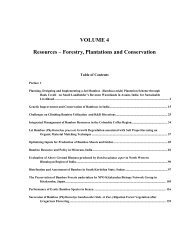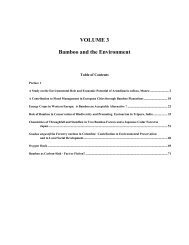VOLUME 2 Bamboo for Thailand and Southeast Asia - BambuSC
VOLUME 2 Bamboo for Thailand and Southeast Asia - BambuSC
VOLUME 2 Bamboo for Thailand and Southeast Asia - BambuSC
Create successful ePaper yourself
Turn your PDF publications into a flip-book with our unique Google optimized e-Paper software.
outlets <strong>for</strong> a new market. This choice to support directly local entrepreneurs to develop new markets is a risky<br />
<strong>and</strong> strategic one. The project is accepting to support partially a risk with stakeholders they are working with.<br />
Doing so, they are becoming part of the market system, which is contrary to best practices promoted in this<br />
field. But when the role of projects is to act as service provider, to facilitate linkages, strengthen entrepreneurs, it<br />
is sometimes difficult to identify the limit between market support <strong>and</strong> market distortion. Is it justified to<br />
support one pre-processing workshop if the manager is facing difficulties with buyers? How far the project<br />
should support this entrepreneur, share the risk with him?<br />
One could argue that if local entrepreneurs can not invest themselves, leading firms could be major players.<br />
Some experiences had been conducted by the project with leading firms but it was not successful, short-term<br />
commercial views overtaking longer term agreements. The above paragraph stressed that in the current situation<br />
it is easier <strong>for</strong> SMEs to sustain growth locally, as no proper linkages are in place with leading firms. In Vietnam<br />
the latter are indeed exerting pressure <strong>for</strong> cost reduction <strong>and</strong> compressing the margins of their suppliers, more<br />
especially in a situation of Oligopsony, as it is the case in Thanh Hoa. Be<strong>for</strong>e lead firms being able to contribute<br />
to local development, a long term intervention to up-grade supply chain <strong>for</strong> more collaborative approaches is<br />
necessary, involving leading firms <strong>and</strong> promoting responsible business <strong>and</strong> sustainable management of<br />
resources; in parallel, a short term strategy to support in priority SMEs <strong>and</strong> favor more competition between<br />
leading firms is also important to create the conditions <strong>for</strong> sound future development.<br />
To facilitate local sustainable development at scale without leading firms <strong>and</strong> with limited project intervention,<br />
attracting responsible investors is recommended: it means that market development will not be artificially<br />
supported <strong>and</strong> that better practices, more sustainable development will be favored. It is the case <strong>for</strong> instance <strong>for</strong><br />
the bamboo activated charcoal. When investors can not be identified, it means that the risk is too high <strong>for</strong> them.<br />
If the project is investing instead of private actors, then the decision process should be very methodically<br />
justified (environmental impact, poverty reduction, cleaner production, etc.), <strong>and</strong> the risk should be supported<br />
<strong>and</strong> accepted by donors. Doing so, the project <strong>and</strong> donors are setting a – more or less <strong>for</strong>malized - public-private<br />
partnership promoting innovation, more responsible <strong>and</strong> sustainable businesses. As noted by Warner <strong>and</strong> Kahan<br />
(2008), such involvement of donors can make the venture more attractive to other potential investors.<br />
When development practitioners are operating in disadvantage areas, even if a real potential exist, it will not be<br />
easy to attract investors or have the support of leading firms, the latter having often short term strategies <strong>and</strong><br />
constraints not compatible with long term <strong>and</strong> balanced development of nascent markets. Supporting directly<br />
<strong>and</strong> strongly SMEs, in this context, should not be disregarded as market distortion, as – in fact – market should<br />
be modified, in the sense of better functioning, more innovation, diversification of production, etc. To achieve<br />
this goal, public financial support (from donors <strong>and</strong> local authorities) can be used to support local actors <strong>and</strong><br />
attract private participation into risky supply chains. Lead firms have also an important role to play, if they agree<br />
to promote more sustainable practices, <strong>for</strong> their long term interest. They should there<strong>for</strong>e not be opposed to<br />
SMEs or farmers, but linked up-stream as much as possible to increase awareness <strong>and</strong> long term commitment.<br />
VIII World <strong>Bamboo</strong> Congress Proceedings Vol 2-45




